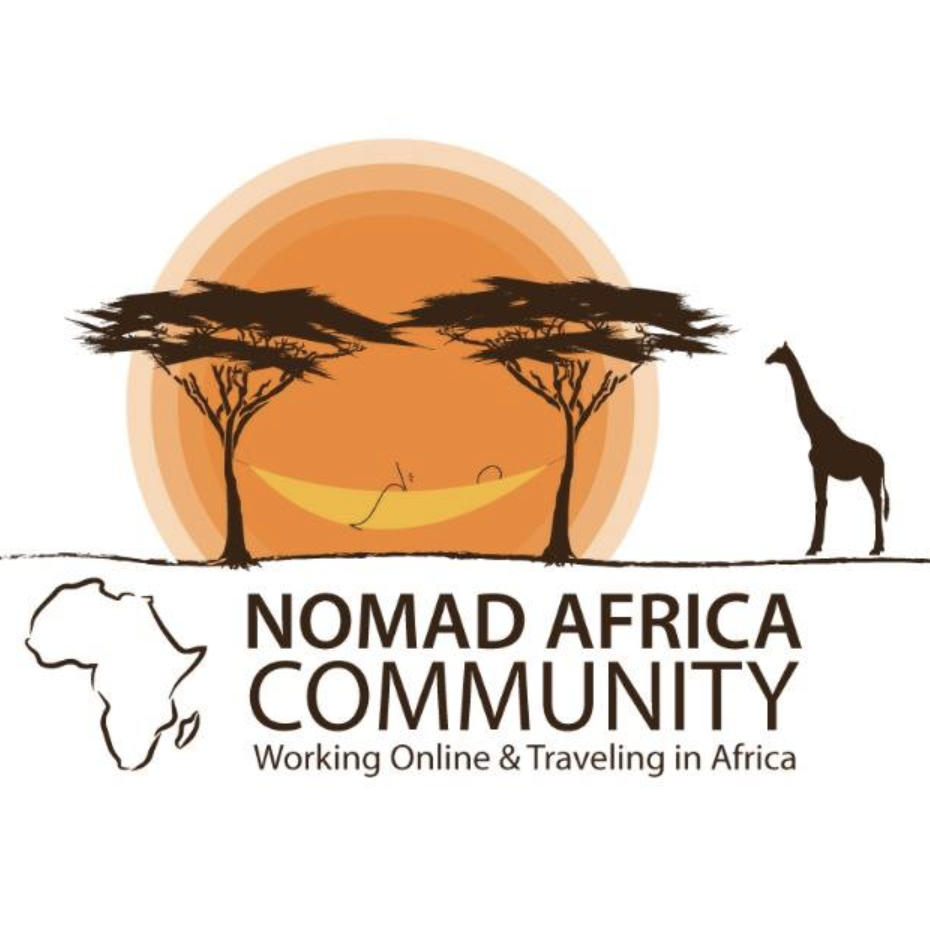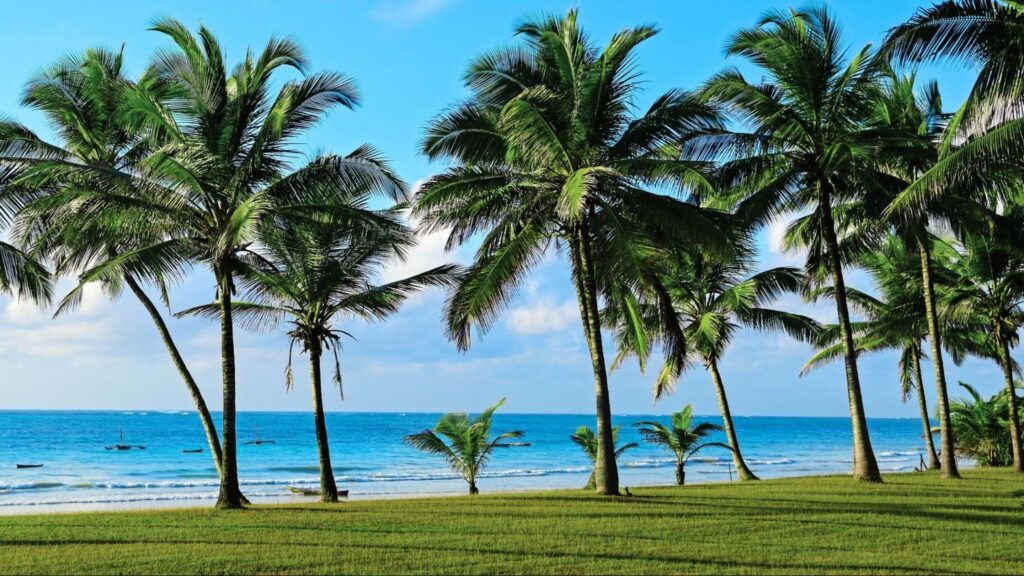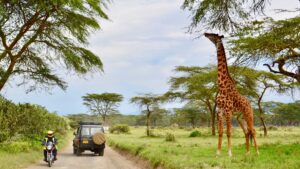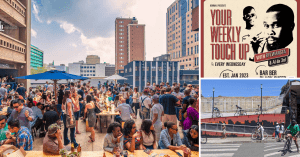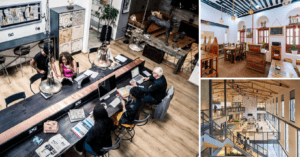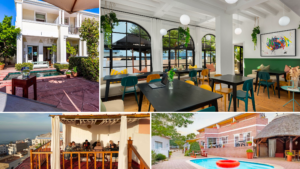From the bustling markets of Marrakech to the beautiful beaches of Essaouira, there is something for everyone in this fascinating country. Additionally, there are many co-working spaces throughout Morocco, providing digital nomads with a comfortable and productive work environment in some spectacular locations.
Additionally, Moroccan cuisine is known for its unique blend of flavors and spices, making it a foodie’s paradise. In this guide, we will provide recommendations for the best places to eat and explore while working remotely in Morocco.
In this quick guide, we’ll show you everything you need to know about working online and traveling as a digital nomad in Morocco.
Jump To:
Things to Do in Morocco | Destinations | Internet | Coworking Spaces | Coliving Spaces | Best Times to Visit | Visas | Cost of Living | How to Get There | Culture and Lifestyle | Safety and Security
Got a question about remote working in Morocco?
If you want to know something we haven’t covered in this guide, you can ask in our free Facebook Community. We’ve got 2,400+ seasoned Africa nomads ready to provide the latest, most honest advice.
| Main Languages | Arabic, French |
| Capital city | Rabat |
| Main airport(s) | Mohammed V International Airport (Casablanca), Marrakesh Menara Airport, Tangier Ibn Battouta Airport |
| Currency | Moroccan Dirham (MAD) |
| Time Zone | Western European Time (GMT+1) |
| Plug Socket Type | Type C and E |
| Best time(s) to Visit | March to May and September to November |
| Internet Quality | Good |
| Highlights | Rich Culture; Desert Safari; Atlas Mountains Hiking |
Things to Do in Morocco
Morocco is a country of contrasts that offers digital nomads a unique blend of culture, history, and adventure. From the bustling medinas of Marrakech and Fes to the laid-back coastal cities of Essaouira and Tangier, there’s something for everyone in this North African gem. Here are some of the top attractions and things to do in Morocco:
Explore the Medinas
The medinas in Morocco are a must-visit for any digital nomad. These ancient walled cities are full of winding streets, colorful markets, and stunning architecture. Marrakech’s medina, for example, is a UNESCO World Heritage Site that boasts the famous Jemaa el-Fnaa square, while Fes’s medina is the largest pedestrian-only area in the world and home to the oldest university in the world.
Surfing and Adventure
Morocco’s coastline is a surfer’s paradise, with world-class waves in spots like Taghazout and Essaouira. For those looking for adventure, the Atlas Mountains offer hiking, mountain biking, and even skiing in the winter months. And of course, no trip to Morocco is complete without a camel trek in the Sahara desert.
Relax in a Hammam
Hammams, or traditional bathhouses, are a popular pastime in Morocco. These steamy sanctuaries are the perfect place to relax and rejuvenate after a long day of work or exploring. Some of the best hammams can be found in Marrakech and Fes.
Sample Local Food
Moroccan cuisine is a feast for the senses, with fragrant spices, tender meats, and fluffy couscous. Some must-try dishes include tagine, a slow-cooked stew, and harira, a hearty soup. For the adventurous foodies, there’s also camel meat and snail soup. Don’t forget to wash it all down with a cup of sweet mint tea.
Visit Chefchaouen
The picturesque blue city of Chefchaouen is a digital nomad’s dream. This charming town is nestled in the Rif Mountains and is famous for its blue-painted houses and winding streets. It’s the perfect place to escape the hustle and bustle of the big cities and enjoy a slower pace of life.
Morocco has so much to offer digital nomads, from the vibrant medinas to the stunning natural landscapes. Whether you’re looking for adventure or relaxation, there’s something for everyone in this fascinating country.
Best Destinations for Digital Nomads
Morocco has become a popular destination for digital nomads due to its affordable cost of living, vibrant culture, and stunning landscapes. Here are some of the best destinations and places to live for digital nomads in Morocco:
Marrakech
Marrakech, also known as Marrakesh, is a vibrant city in the heart of Morocco. It is known for its stunning architecture, bustling souks, and lively nightlife. Marrakech is a great destination for digital nomads who want to experience the rich culture of Morocco while still having access to modern amenities. Gueliz is a popular neighborhood for digital nomads in Marrakech, as it has many cafes and co-working spaces.
Fez
Fez, also known as Fes, is a historic city in northern Morocco. It is known for its maze-like medina, which is a UNESCO World Heritage Site. Fez is a great destination for digital nomads who want to immerse themselves in Moroccan history and culture. The city has many affordable accommodations and co-working spaces, making it a great place to live for digital nomads on a budget.
Essaouira
Essaouira is a coastal city in western Morocco. It is known for its beautiful beaches, vibrant arts scene, and laid-back atmosphere. Essaouira is a great destination for digital nomads who want to live near the beach and enjoy a slower pace of life. The city has many cafes and co-working spaces, making it a great place to work remotely.
Rabat
Rabat is the capital city of Morocco. It is a modern city with a mix of traditional and contemporary architecture. Rabat is a great destination for digital nomads who want to live in a bustling city with access to modern amenities. The city has many co-working spaces and cafes, making it easy to work remotely.
Tangier
Tangier is a historic city located on the Strait of Gibraltar. It is known for its stunning views and rich history. Tangier is a great destination for digital nomads who want to live in a city with a mix of European and Moroccan culture. The city has many cafes and co-working spaces, making it easy to work remotely.
Agadir
Agadir is a resort city located on the Atlantic coast of Morocco. It is known for its beautiful beaches and sunny weather. Agadir is a great destination for digital nomads who want to live near the beach and enjoy a relaxed lifestyle. The city has many cafes and co-working spaces, making it easy to work remotely.
Overall, Morocco has many great destinations and places to live for digital nomads. Whether you prefer a bustling city or a relaxed beach town, Morocco has something for everyone.
Internet Connectivity
One of the most important factors for digital nomads when choosing a destination is internet connectivity. Fortunately, Morocco has a robust and reliable internet infrastructure. According to Jack Roaming, Morocco’s internet speed is among the fastest in Africa, with an average speed of 7.36 MBps. This makes it easy for digital nomads to work remotely and stay connected with their clients and colleagues.
Most cafes, restaurants, and hotels in Morocco offer free Wi-Fi, but the quality of the connection can vary. If you need a more reliable internet connection, it’s best to rent an apartment or stay in a co-living space that offers high-speed internet. Explore With Lora states that most digital nomads can live in Morocco on an average monthly budget of 1500-2000 USD, which includes accommodation with good internet connectivity.
To stay connected while on the go, you can purchase a local SIM card from one of the many mobile network providers in Morocco, such as Maroc Telecom, Orange, or Inwi. You can find SIM cards at the airport or in mobile phone shops throughout the country. Nomad List lists the cost of a SIM card with 1GB of data at around 10 MAD (1 USD).
It’s worth noting that while Morocco has a reliable internet infrastructure, there may be occasional power outages or internet disruptions, particularly in rural areas. It’s always a good idea to have a backup plan, such as a mobile hotspot or a generator, in case of an outage.
Overall, digital nomads can enjoy a fast and reliable internet connection in Morocco, whether they choose to work from a co-living space, a cafe, or their own apartment.
Coworking Spaces
Morocco is a great destination for digital nomads, and coworking spaces are a great way to connect with other like-minded people while working remotely. Here are some of the best coworking spaces in Morocco.
Coworking in Marrakech
Marrakech is a popular destination for digital nomads, and there are several great coworking spaces in the city. One of the most popular is Coworking Hivernage, which offers a range of flexible coworking options, including hot desks, dedicated desks, and private offices. The space is located in the heart of the city, making it easy to get to and from.
The Spot
The Spot is a popular coworking space in Marrakech that offers a range of flexible options for digital nomads. The space is located in the heart of the city, making it easy to get to and from. The Spot offers a range of amenities, including high-speed internet, meeting rooms, and a communal kitchen.
Meeting Rooms
Many coworking spaces in Morocco offer meeting rooms for rent. This is a great option for digital nomads who need to meet with clients or collaborators. Coworking Hivernage, for example, offers several meeting rooms that can be rented by the hour or by the day.
Coworking Spaces in Other Cities
While Marrakech is a popular destination for digital nomads, there are also several great coworking spaces in other cities in Morocco. For example, Dar Digital Nomad in Casablanca offers a range of flexible coworking options, including hot desks, dedicated desks, and private offices. The space is located in the heart of the city, making it easy to get to and from.
Overall, coworking spaces are a great way to connect with other like-minded people while working remotely in Morocco. Whether you’re looking for a place to work, meet clients, or collaborate with others, there are plenty of options available in Morocco.
Coliving Spaces
Morocco has become a popular destination for digital nomads due to its affordability, good climate, and convenient location. Coliving spaces are a great option for those who want to live and work with other like-minded individuals while exploring the country. Here are some coliving spaces to consider:
Nomad House Morocco
Nomad House Morocco is a coliving space located in the heart of the medina in Marrakech. The house has a rooftop terrace with views of the city, a communal kitchen, and a coworking space with high-speed internet. The house can accommodate up to 10 people and offers private and shared rooms. The cost of living here is affordable, and it is a great option for those who want to experience Moroccan culture and local customs.
Outsite Marrakesh
Outsite Marrakesh is a traditional riad complete with a pool, hammam, and rooftop terrace. The coliving space has a shared kitchen, indoor patios, outdoor terraces, and a workspace furnished with ornate Moroccan textiles and crafts. Outsite Marrakesh is a serviced coliving space designed for digital nomads, flexible professionals, and business travelers who want to live and work in a comfortable and inspiring environment.
Atic Coworking
Atic Coworking is a popular choice for digital nomads who want a professional and well-equipped workspace. The coworking space has private offices, meeting rooms, and high-speed Wi-Fi. Atic Coworking has two locations in Marrakech and Rabat and is a great option for those who want access to a quiet and productive work environment.
When considering coliving spaces in Morocco, it is important to keep in mind the language barrier and culture shock that may be experienced. Moroccan culture is unique, and it is important to be respectful of local customs and traditions. Additionally, obtaining visas for long-term stays can be challenging, so it is important to plan accordingly.
Overall, coliving spaces in Morocco offer a great opportunity for digital nomads to experience the country’s culture and local food while living and working in a comfortable and affordable environment.
Best Times to Visit
Morocco is a beautiful country with a diverse landscape and a rich culture. It is a great destination for digital nomads looking for a change of scenery and a new experience. However, before planning your trip, it is important to know the best times to visit.
Climate
Morocco has a Mediterranean climate with hot summers and mild winters. The best time to visit is during the spring (March to May) and autumn (September to November) when the weather is mild and pleasant. During these months, the temperature is around 20-25°C (68-77°F) in most parts of the country.
In the summer (June to August), the temperature can rise to above 40°C (104°F) in some areas, making it uncomfortable for some people. The winter months (December to February) can be quite cold, especially in the mountains and the desert regions.
Winter Months
If you are planning to visit Morocco during the winter months, it is important to pack warm clothing as the temperature can drop to freezing point in some areas. However, this is also a good time to visit if you want to avoid the crowds and enjoy the beauty of the snow-capped mountains.
Worst Times to Visit
The worst time to visit Morocco is during the summer months when the temperature is high, and the crowds are at their peak. This is also the time when many businesses and shops close for the day due to the heat.
Another time to avoid is during the month of Ramadan when many restaurants and cafes are closed during the day. This can make it difficult for digital nomads who need to work during the day.
In conclusion, the best time to visit Morocco is during the spring and autumn months when the weather is mild and pleasant. However, if you don’t mind the cold, the winter months can also be a good time to visit. It is best to avoid the summer months and the month of Ramadan if you want to avoid the crowds and have a more comfortable experience.
Tourist and Digital Nomad Visas
Morocco is a popular destination for both tourists and digital nomads. Tourists from many countries can enter Morocco without a visa for up to 90 days. However, if you plan to stay longer, you may need to apply for a visa. The visa application process can be time-consuming and bureaucratic, so it’s best to start early.
For digital nomads, Morocco offers a special visa program called the “Morocco Digital Nomad Visa.” This program allows foreign nationals to stay in Morocco for up to one year and work remotely for a foreign company or for themselves. The visa is available to citizens of many countries, including the United States, Canada, and most European Union countries.
To apply for the Morocco Digital Nomad Visa, you will need to provide a variety of documents, including proof of income, proof of health insurance, and a criminal background check. The application process can take several weeks, so it’s important to plan ahead.
It’s worth noting that the bureaucracy in Morocco can be challenging, and the visa application process is no exception. It’s important to be patient and persistent, and to seek help from a local immigration lawyer if needed.
Overall, Morocco is a welcoming destination for both tourists and digital nomads. With the right visa and preparation, you can enjoy all that this fascinating country has to offer while working remotely.
Cost of Living
As a digital nomad in Morocco, one of the most important things to consider is the cost of living. Fortunately, Morocco is a relatively affordable country, with a low cost of living compared to many Western countries. Here are some of the key factors to keep in mind when budgeting for your time in Morocco:
Accommodation
The cost of accommodation in Morocco will vary depending on where you choose to stay. In general, smaller towns and cities outside of the tourist hotspots tend to be more affordable. For example, you can find affordable long-term accommodations in towns like Fez and Essaouira for around $500 per month. If you prefer to stay in a larger city like Marrakesh or Casablanca, you can expect to pay closer to $1,000 per month for a decent apartment.
Food and Drink
One of the best things about Morocco is the delicious and affordable food. You can find a wide range of tasty street food and local restaurants for very reasonable prices. A typical meal at a local restaurant will cost you around $5-10, while street food can be even cheaper. If you prefer to cook at home, you can find fresh produce and groceries at local markets for very affordable prices.
Transportation
Transportation in Morocco is also very affordable. You can take a local bus or shared taxi for just a few dollars, or hire a private driver for longer trips. If you plan to stay in one place for a while, you may also want to consider renting a car or scooter. Rental prices vary depending on the type of vehicle and the length of your rental, but you can generally find good deals for around $20-30 per day.
Other Expenses
There are a few other expenses to keep in mind when budgeting for your time in Morocco. For example, you may need to pay for a SIM card and mobile data plan if you want to stay connected while you’re on the go. You may also want to factor in the cost of activities and excursions, such as visiting historical sites or exploring the local countryside.
Overall, Morocco is a very affordable destination for digital nomads. With a low cost of living and plenty of affordable options for accommodation, food, and transportation, you can live comfortably on a budget while enjoying all that this beautiful country has to offer.
How to Get There
Morocco is a popular destination for digital nomads due to its rich culture, stunning landscapes, and affordable cost of living. Getting to Morocco is relatively easy, with several transportation options available.
By Air
The most convenient way to get to Morocco is by air. The country has several international airports, including Mohammed V International Airport in Casablanca, Marrakesh Menara Airport, and Tangier Ibn Battouta Airport. Many major airlines, including Royal Air Maroc, Air France, and British Airways, offer direct flights to Morocco from major cities around the world.
By Train
If you’re already in Europe, taking a train to Morocco is a great option. You can take a train from Spain to Morocco via the Strait of Gibraltar. The train ride is scenic and takes around an hour. Once you arrive in Morocco, you can take a train to other parts of the country. The train system in Morocco is modern, efficient, and affordable.
By Bus
Another option for getting to Morocco is by bus. Several bus companies operate routes between Morocco and other countries in North Africa and Europe. The journey can take several hours, but it’s a cost-effective way to travel.
By Taxi
If you prefer a more personalized experience, you can take a taxi to Morocco. Taxis are available in several cities in Europe and North Africa. The journey can be expensive, but it’s a comfortable way to travel.
Accommodation
Once you arrive in Morocco, you’ll need a place to stay. Airbnb is a popular option among digital nomads. You can find affordable apartments and homes in most major cities in Morocco. It’s also a great way to meet locals and experience Moroccan culture firsthand.
Traffic
Traffic in Morocco can be chaotic, especially in major cities like Marrakech and Casablanca. It’s important to be aware of your surroundings and follow traffic rules. If you’re planning to drive in Morocco, make sure you have a valid driver’s license and insurance.
Culture and Lifestyle
Morocco is a country with a rich and diverse culture that is heavily influenced by its history, religion, and geography. As a digital nomad, you will have the opportunity to experience this culture first-hand. In this section, we will explore some of the key aspects of Moroccan culture and lifestyle.
Culture and History
Morocco has a unique blend of French and Arabic cultures, which is reflected in its architecture, language, and customs. The country has a rich history that dates back to ancient times, with influences from Berber, Arab, and European cultures. As a digital nomad, you can explore the country’s rich history by visiting its many historic sites, such as the Roman ruins at Volubilis or the medieval city of Fes.
Cuisine
Moroccan cuisine is a blend of Mediterranean, Arabic, and Berber influences. It is known for its use of spices and herbs, such as cumin, coriander, and saffron. As a digital nomad in Morocco, you can sample a variety of traditional dishes, such as tagine (a slow-cooked stew) or couscous (a type of semolina pasta). Moroccan cuisine is also known for its sweets, such as baklava and chebakia.
Art and Music
Morocco has a rich tradition of art and music, which is influenced by Islamic and Berber cultures. Moroccan art is known for its intricate geometric patterns and bright colors, which can be seen in everything from pottery to textiles. Moroccan music is also diverse, with influences from Arab, Berber, and Andalusian cultures. As a digital nomad in Morocco, you can explore the country’s art and music scene by visiting local galleries and attending live performances.
Festivals
Morocco is known for its vibrant festivals, which are celebrated throughout the year. These festivals are often tied to religious or cultural events and provide an opportunity to experience Moroccan culture firsthand. Some of the most popular festivals include the Fes Festival of World Sacred Music, the Marrakech International Film Festival, and the Mawazine World Rhythms Festival.
In conclusion, Morocco is a country with a rich and diverse culture that is heavily influenced by its history, religion, and geography. As a digital nomad, you can explore this culture by sampling traditional cuisine, experiencing local art and music, and attending festivals.
Safety and Security
When traveling to Morocco as a digital nomad, it is important to be aware of safety and security concerns. While Morocco is generally a safe destination, it is always a good idea to exercise caution and take necessary precautions.
Safety Tips
Here are some safety tips to keep in mind during your stay in Morocco:
- Be aware of your surroundings and avoid walking alone at night in unfamiliar areas.
- Keep your valuables secure and out of sight, especially in crowded places.
- Avoid carrying large amounts of cash and use ATMs located in well-lit areas.
- Be cautious when using public transportation and avoid overcrowded buses or trains.
- Always wear a helmet when riding a motorcycle or bicycle.
Scams
Like in any tourist destination, there are some scams to be aware of in Morocco. Some of the most common scams include:
- The “helpful” local who offers to show you around the city and then demands money for their services.
- The fake tour guide who takes you to overpriced shops or restaurants.
- The pickpocket who distracts you while their accomplice steals your belongings.
To avoid falling victim to these scams, it is best to research ahead of time and choose reputable tour guides and transportation services.
Islam
Morocco is a predominantly Muslim country, and it is important to respect local customs and traditions. Dress modestly in public places and avoid public displays of affection.
Challenges
As a digital nomad, you may face some challenges during your stay in Morocco. One of the biggest challenges is the language barrier, as many locals speak French or Arabic.
Another challenge is the heat, especially during the summer months. Be sure to stay hydrated and take breaks in air-conditioned spaces when necessary.
Western Sahara and Sahara Desert
If you plan to travel to the Western Sahara or the Sahara Desert, it is important to be aware of the security situation in these areas. The Western Sahara is a disputed territory, and there have been occasional clashes between Moroccan forces and separatist groups.
When traveling in the Sahara Desert, it is best to go with a reputable tour company and bring plenty of water and sunscreen.
Atlantic Ocean and Mediterranean Sea
Morocco has a long coastline along both the Atlantic Ocean and the Mediterranean Sea. While swimming and water sports can be enjoyable, it is important to be aware of the strong currents and potential dangers.
Always swim in designated areas and follow the advice of local lifeguards.
Frequently Asked Questions
What are some good locations for digital nomads in Morocco?
Morocco has many great locations for digital nomads. Casablanca, Marrakech, and Taghazout are popular choices. Casablanca is the largest city and economic center, while Marrakech is known for its stunning architecture and vibrant culture. Taghazout is a small fishing village that has become a popular spot for surfers and digital nomads alike.
What is the cost of living for digital nomads in Morocco?
Morocco is a relatively affordable country for digital nomads. The cost of living varies depending on the location and lifestyle. Accommodation, food, and transportation are generally inexpensive. A digital nomad can expect to spend around $800 to $1,200 per month on living expenses.
What are the visa requirements for working remotely in Morocco?
Morocco allows digital nomads to work remotely on a tourist visa for up to 90 days. If you plan to stay longer, you will need to obtain a residency permit. It is recommended to consult with the Moroccan embassy or consulate in your home country for specific visa requirements.
Are there coworking spaces in Marrakech for digital nomads?
Yes, there are several coworking spaces in Marrakech that cater to digital nomads. Some popular options include Kafountine Coworking, Le Tank Coworking, and SunDesk Coworking.
What is the internet connectivity like in Taghazout for remote work?
Internet connectivity in Taghazout is generally reliable, but it can vary depending on the location. Some cafes and coworking spaces offer high-speed internet, while others may have slower connections. It is recommended to check the internet speed before booking accommodation or choosing a workspace.
What are some tips for surfing and working remotely in Essaouira?
Essaouira is a great location for digital nomads who enjoy surfing. Some tips for combining surfing and remote work include choosing accommodation near the beach, finding a coworking space with a view of the ocean, and planning your work schedule around the tides. It is also important to stay safe while surfing and to protect your equipment from the salty sea air.
